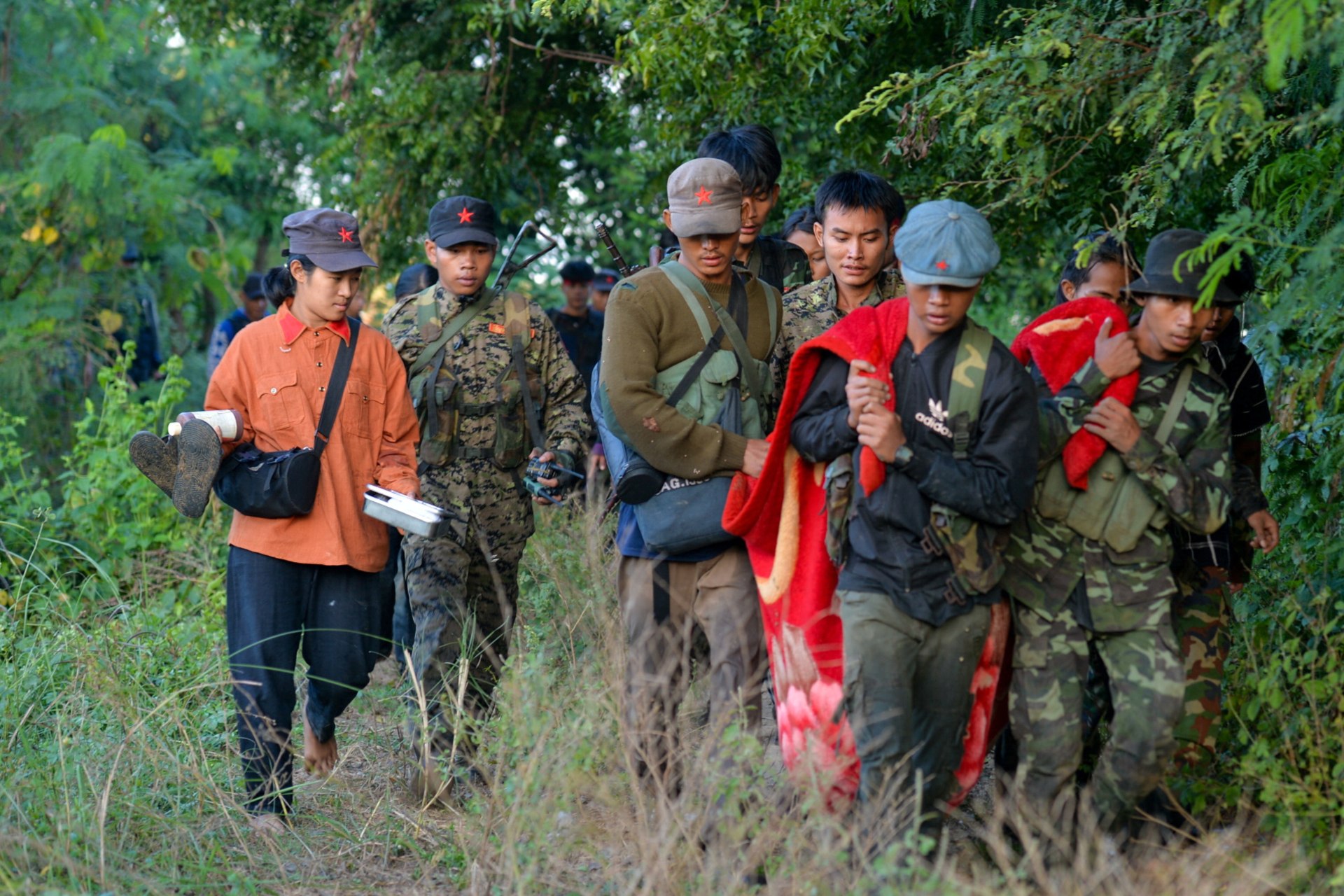Myanmar’s Army is Collapsing: An Update
As the Myanmar military faces a record level of defections, its control of the country looks increasingly tenuous.

By experts and staff
- Published
Experts
![]() By Joshua KurlantzickSenior Fellow for Southeast Asia and South Asia
By Joshua KurlantzickSenior Fellow for Southeast Asia and South Asia
Over the past six months, Myanmar’s armed forces, also known as the Tatmadaw, have increasingly begun to disintegrate. Following the junta’s return to power in a 2021 coup, the military seemed destined to demolish, or at least hold to a standstill, the alliance of armed ethnic minority groups and mostly majority Burman People’s Defense Forces contesting its control—the military had far superior weapons and no problem utilizing the most brutal tactics available. In an earlier blog post, I wrote about this phenomenon, encouraging Myanmar democrats and outside actors to contingency plan for the day after a potential military collapse. Such an idea does not denigrate the work done to form bonds between the ethnic armies and Burman majority groups, as well as the work of the government in exile. A lot can go wrong in the wake of a military collapse, and contingency planning on a large scale is needed now.
Since I wrote that earlier post, the situation has only gotten more dire for the Tatmadaw, and they have responded to their declining fortunes with even greater brutality, if that was even possible. As the Washington Post noted in a lengthy, insightful recent piece about morale in the military, defections, and the terrible conditions soldiers are fighting under, the army is reduced to feeding its soldiers virtually nothing, keeping them isolated in their positions and cut off from the outside world (where they would learn that the military is losing) and brutally treating anyone who tries to escape and is caught.
The Post notes, “Accounts from Myanmar army soldiers who have surrendered or defected over the past three months reveal that the military is suffering from plunging morale and overstretched logistics amid a rebel offensive that has prompted mass surrenders. These accounts, provided by more than thirty soldiers, suggest that the rebels’ recent battlefield successes go beyond mere territorial gains and are undermining the cohesion of the forces defending Myanmar’s military junta. On the battlefield, where pro-democracy fighters and ethnic insurgents are waging a multi-front campaign, calls by army units for reinforcements and resupply of ammunition have frequently gone unanswered, former commanders said. One soldier said rations for his battalion ran so low that troops disguised themselves as civilians to buy food from villagers. Another said combat support personnel were deployed to the battlefront without any training. Some soldiers said they were forced into the military and never wanted to fight in the first place.”
The heavily sourced Post article further notes that soldiers, including conscripts, were being fed rations that did not have enough calories to survive, had minimal equipment, lacked proper clothes and arms, and were often kept from any communication with their families, living what one soldier called “a slave’s life” to the Post reporters.
Escaping the army almost surely meant torture at best and execution at worst, a finding consistent with my own experience talking to defectors from the military. The Post article notes: “Echoing the accounts of other soldiers, Kyaw Lwin, an army private who surrendered outside Loikaw, told police that conditions in the military had been deteriorating. ‘I tried to run away,’ said Kyaw Lwin, twenty-one. ‘But unfortunately, I was caught, and they tortured me a lot.’”
Meanwhile, losing men to defections, surrenders on a scale the armed forces have not faced before, and deaths, the army has imposed conscription for young men and young women. (In the past, the army has at times imposed de facto conscription anyway, simply by impressing villagers into the military for tasks like front-line infantry, serving as human mine sweepers, forced portering, and other brutal tasks.) But this order only shows the desperation of the Tatmadaw, and it is likely to backfire. With the order now public, young men and many women who have not already gone into hiding, joined the PDFs or ethnic armies, or fled across the border into Thailand and then sometimes onto third countries are increasingly doing just that—augmenting the military’s opponents and sucking recruits away from the Tatmadaw.
On the battlefield, the army suffers one defeat after the next while also losing critical foreign backers. As Ivan U. Klyszcz and Harold Chambers note in The Diplomat, three years after the February 2021 coup, “more than three hundred military-controlled bases and towns—including crucial border crossings with China, India, and Thailand—have been taken by anti-junta forces.” Meanwhile, they note, the junta has increasingly had unstable relations with China due to the presence of massive crime groups targeting China inside Myanmar, as well as fighting along the border. Now, the junta can only rely on Russia—clearly distracted by a much bigger war of its own—as a critical partner.
At the same time, the junta faces an opposition with high morale and is slowly working together more effectively, as noted by a study released on the third anniversary of the coup by the United States Institute of Peace. The study notes: “Myanmar’s resistance is one of the most successful anti-authoritarian movements the world has ever seen. Unlike previous pro-democracy movements in Myanmar that involved segments of society, today’s national uprising is sweeping in diverse actors who have demonstrated a willingness to make enormous sacrifices to resist the junta. This is the basis for the resistance movement’s success, accomplished despite minimal international support and major structural disadvantages.” They further note: “Just since October, more than 5,500 junta troops have been killed or captured, including 10 brigadier generals, and more than 30 towns have been taken by the resistance. Overall, the junta has lost no less than 30,000 soldiers since the coup.”
Given these obstacles, much more significant defections from the military that render it ineffective in much of the territory it still controls, rebel attacks on big cities in central Myanmar, or splits in the top of the military that paralyze it or force it to come to the table and sue for peace—all of these are now possibilities.
